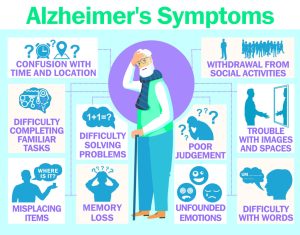Sept. 21 is World Alzheimer’s Day, an annual event that recognizes the struggle those diagnosed with it and their loved ones have in dealing with this insidious disease. According to senior home care service Right at Home, 5.7 million people currently live with a form of dementia in the United States. Roughly 60 to 70 percent of those cases fall under the Alzheimer’s Disease diagnosis.
Hicksville’s Patti Carpenter is the Right at Home North Shore Long Island director of patient services and has had three decades-plus experience as a home care nurse and estimates about 35 percent of patients have dementia. In her role teaching families how to cope and interact with their loved ones, Carpenter said recognizing early signs is a key to learning how to handle dementia for both the person afflicted and their loved ones.
“In the beginning, the more you work with somebody who has early onset dementia, the better they can do because they have to start focusing on their abilities and what they can do and not what they can’t do,” Carpenter explained. “Some of the warning signs of dementia include people starting to forget their words. They’ll start using their words wrong. They may go to pick up their keys and say they have milk in their hands. You start using words in the wrong context or just forget them. You start losing your short-term memory. Whatever happened yesterday or even moments ago is gone—you don’t have that anymore. You can’t remember. You keep asking the same question over and over again. That’s another early sign too—the repetitiveness—when somebody asks you a question and five minutes later they ask the same question. It’s very common.”
Carpenter’s training has earned her special certification to better understand clients with cognitive decline or dementia, to assess his or her abilities and to adjust their interaction in the most beneficial way. For dementia patients, simple tasks like showering become significantly more difficult to the point of exacerbating physical fatigue in the patient.
“People with dementia exhaust themselves because tasks become so hard and their mind is constantly trying to remember what they need to do next,” Carpenter said. “Sometimes they can just sit in a chair and be doing nothing because they have no interest in doing anything anymore because everything is more challenging for them. They start shutting themselves off because everything has become so monumental to do.”
When someone is first diagnosed with dementia, Carpenter advises loved ones to allow the person to grieve over their diagnosis. From there, it’s important to establish routines and find simple tasks for them to do that they enjoy. Simplicity of tasks is paramount and so is awareness of how quickly dementia patients fatigue. Caregivers should also be aware of sundowning, a phenomenon where their charges experience confusion and agitation around dusk.
“It’s important for them to have that be the calming part of the day and not have them be alone where they can be fearful,” Carpenter said.
Patience is paramount despite how much it is short supply and how Alzheimer’s is a situation where all parties learn to expect the unexpected.
“What you want them to do is make them feel good about themselves by enabling them to do something that they’re going to be successful at,” Carpenter said. “After all, they’re still human and still have feelings. It’s just that they don’t have their memory.”





























